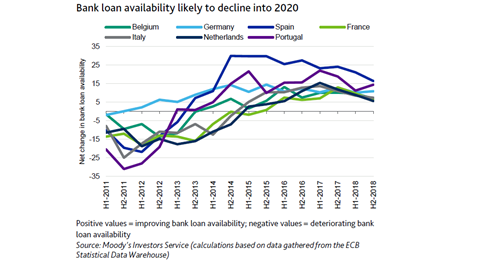New CMBS issuance in Europe will continue to be backed by moderately leveraged loans in 2020 as recessionary dangers and political risk restrain LTV ratios, Moody’s Investors Service said in a report published this week.

'The low interest rate environment in Europe shows little signs of abating in the short term and negative European sovereign yields have led to record high property values,' said Stephen Hughes, AVP-Analyst at Moody’s. 'The threat of recession across many Western European countries amid greater political risk is helping to prevent LTVs reaching 2006-7 levels.'
New deals are likely to have LTV ratios in the 60-65% range, with the increasing use of further mezzanine debt, pushing up overall leverage levels. Still, many of these loans will likely be highly leveraged when values referencing historic long-term yields are used. Transactions will increasingly have exposure to loans backed by specialist property types (those not used for offices, logistics or retail). These will incorporate a number of stronger features to mitigate their risk amid limited alternative use.
There will be further growth in the e-commerce sector, at the expense of demand for shops, shopping centres and retail warehouses. This structural shift will continue throughout Europe in
2020, leaving many towns and cities with excess supply of retail properties. Industrial assets have been a safe haven for investors in recent years and are set to do well in 2020.
Environmental factors will influence more investors in 2020, as stricter mandates preclude them from investing in assets that do not meet certain environmental, social and corporate governance (ESG) criteria. Moody’s expects large corporate tenants to require their current or next offices to conform to the highest green label quality standards. Landlords are likely to spend more retrofitting older offices to higher environmental and energy-efficient standards, so they can be marketed to the widest possible tenant base.
'Underwriting standards will generally remain prudent but are becoming looser in certain RMBS and ABS market segments, resulting in emerging pockets of credit risk,' said Lisa Macedo, VP-Senior Analyst at Moody's. 'And as the credit cycle enters its late stages, high levels of consumer indebtedness, increasing leverage of companies, and future weakening of macroeconomic indicators, will start to weigh negatively on securitisation performance.'
Supporting documents
Click link to download and view these filesOutlook - Structured-Finance-Europe - 04Dec19
PDF, Size 2.62 mb











